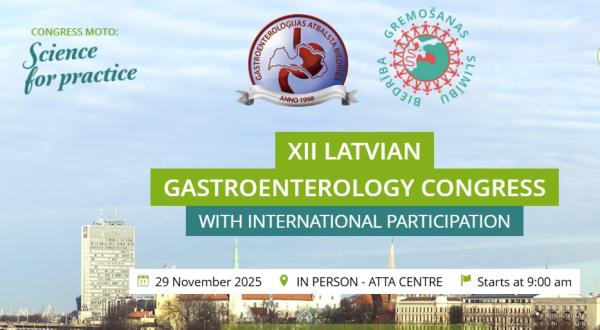RSU residents improve their laparoscopic surgery skills
Residents from the Faculty of Continuing Education partook in a training session on 6 June at the Doctors Safe Train (DST) operating theatre. It is a modern operating theatre equipped with innovative medical devices where the residents were able to practice performing complicated procedures under the supervision of experienced surgeon Sergejs Šapovalovs. The eight prospective physicians were gathered around two operation tables to learn various skills in life-like conditions. They learned how to perform surgical and laparoscopic procedures on live tissues, for instance, how to close an acutely perforated gastric ulcer, or how to stop bleeding. The monitors above the operation tables allowed the residents to see how even the smallest hand movement affected the use of each specific tool.
The training day did not begin in the operating theatre, but rather in the DST lecture room where residents were introduced to the opportunities that the centre offers, their tasks for the day, the methods they would use, and the expected outcomes. Laparoscopic surgeries are safer for patients compared to traditional operations. They are less traumatising and the patients recover and regain their abilities faster. However since these operations are very specific the physicians require very precise skills. It is therefore very important to train on live tissues before operating on a patient. Resident Igors Losevs confirms this and emphasises that the opportunity to train on live tissues in simulated operation conditions is crucial to improving patient safety. Losevs believes that the conditions provide a special feeling and understanding making residents realise the importance and the implications of what they are learning.
Urology resident Ieva Grīnberga emphasises the unique nature of the centre on a European level. She is convinced that it can become an excellent training site for students from many other medical universities. When asked about what she has learned, Grīnberga emphasises how much she has gained from the opportunity to examine the gallbladder, the kidneys and other organs specific to the specialisation she has selected.
During the second half of the day thirteen general practitioner residents arrived to practice skills that they require in their daily work - stitching a wound, tying knots, removing stitches etc.

Resident training is organised and supervised by Aleksandrs Maļcevs, a DST Board Member. He says that this type of training performed under conditions so close to a real-life setting with an experienced surgeon, an anaesthesiologist and a surgical nurse and using expensive medical devices is very valuable and a unique opportunity. It is therefore important to develop an intensive international co-operation through DST. Already now the centre co-operates with partners from Kazakhstan and Uzbekistan to enable medical students from these countries to come and receive training at DST. The involvement of the University of Kaunas is transforming this endeavour from a project undertaken by RSU and the Latvia University of Life Sciences and Technologies into a training centre utilised by all the Baltic States. So far the centre has welcomed participants from courses not only from the Baltic States, but from Germany, Sweden, Russia, Italy, Romania, France, Austria, the United Kingdom, Egypt and others.
Related news
 Medical students and residents invited to apply for XII Latvian Congress of GastroenterologyConferences, workshops, Graduate Medical Training
Medical students and residents invited to apply for XII Latvian Congress of GastroenterologyConferences, workshops, Graduate Medical Training


